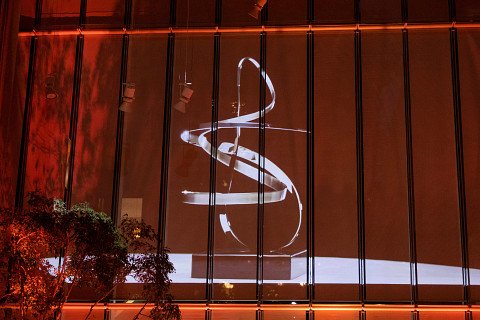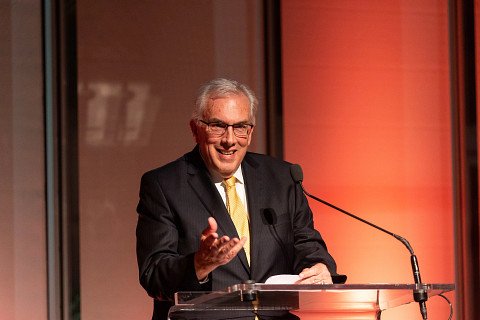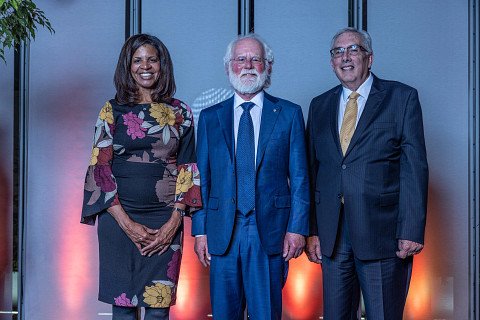
Please accept my sincere appreciation and gratitude for being named one of the three awardees of the 2022 Harold W. McGraw, Jr. Prize in Education. This is a tremendous honor, and I am extremely humbled to have been chosen.
I want to extend my congratulations to my fellow winners this year, Drs. Roy Pea and Cheryl Logan, and to all of the previous winners over these many years. Education is the most powerful and transformative agent of change in our society, and I am humbled to be recognized for my work in this critically important field.
I want to thank the selection committee for choosing me. As a professional in education, I am well aware of the great work that is being done across the country to improve education at all levels, and I am honored that they chose me.
Of course, my thoughts are with my parents this evening. They passed long ago, but I am so grateful for their unconditional love and support, plus instilling in me a set of core values that have been the foundation of my life.
I want to thank my brothers, Gregg and Roger who have supported me my whole life and for joining us tonight.
I also want to thank my friend Mr. Marshall Matz, who early on recognized the transformative nature of my work and has been a tremendous advocate and supporter. And I want to thank Marshall and his wife Debbie for joining us tonight.
And a special thank you to my leadership team at South Dakota State University, who have never wavered in their support of the Wokini Initiative, and who have worked tirelessly to bring it to life.

Most importantly, I want to thank my loving wife Jane, who is the first to hear about my ideas and concepts, and who has provided a gentle, guiding and supportive hand to me for the past 45 years.
Following the tumultuous period of western expansion into the homelands of the Lakota, Dakota and Nakota people in the 1850s through the 1880s, Sitting Bull, Chief of the Hunkpapa Tribe of the Lakota people, provided the following challenge: "Let us put our minds together and see what life we can make for our children."
Quite frankly, and sadly, 140 years later, we have fallen short in meeting his challenge, and are still seeking ways to build a sustainable future for his heirs.
In its 141-year history, South Dakota State University has accomplished many things and has much to be proud of. But it too has struggled to meet not only Sitting Bull’s challenge, but also to fulfill our land grant mission of providing access to the benefits of Higher Education for all of the citizens of South Dakota, of which nearly 10% are Lakota, Dakota or Nakota. Historically, enrollments of these students in South Dakota State have been very low and their graduation rate has been unacceptable.
When I became president of South Dakota State, I challenged our university to use our collective imaginations to meet the challenges of the future and at the same time to re-imagine how we address lingering challenges.
The great 20th century theologian and philosopher, C.S. Lewis, once said: “You can’t go back and change the beginning, but you can start where you are and change the ending.”
In order to change the ending for the indigenous people of our state, the university basically started from scratch, owning our past, acknowledging our responsibility, and dedicating the annual flow of funds from our land grant land to benefit the heirs from whom the land was taken so very long ago.
We committed ourselves to ambitious goals to enable the members of the nine tribal nations in our state to succeed at South Dakota State. We’ve adopted a holistic approach to student success, addressing financial, social, cultural, mental health and educational needs on an individual basis.
And because of very generous donors, we built a beautiful new American Indian Students Center in the heart of campus and have nearly $19 million in an endowed scholarship fund.
In our seventh year, and recognizing that we have a long way to go, we have had early success in building lasting change into our university to better serve Native American students.

Enrollments have increased, along with much improved rates of retention and graduation. With the authorization of federal legislation entitled New Beginnings for Tribal Students, and with annual appropriations for funding, land grant universities and tribal colleges and universities across the country now have tens of millions of dollars of new money to address Sitting Bull’s challenge and all of our responsibility.
My mother, Sarah, was born in the humblest of conditions on the Rosebud Indian Reservation. Because she was Lakota, she was not considered a citizen of the United States. Her father, my grandfather, received his early education in a boarding school.
When Sarah graduated from college, less than 4% of the women in America had a college degree. Unfortunately, I don’t know all the details of how this little girl from Rosebud found her way and accomplished so much, but I gratefully stand on her shoulders, and dedicate this award to her memory.
Thank you again for this prestigious award and for recognizing my work, and that of the team I lead.

